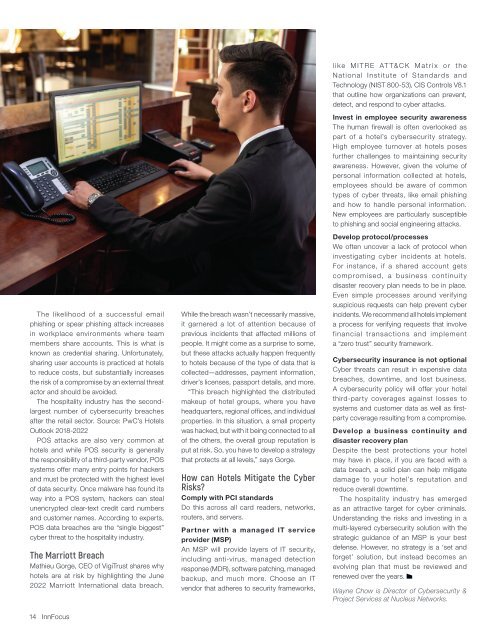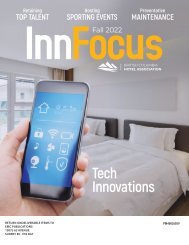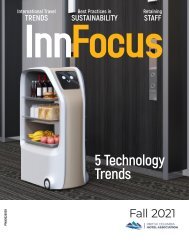InnFocus Winter 2022
InnFocus magazine for hoteliers in British Columbia
InnFocus magazine for hoteliers in British Columbia
Create successful ePaper yourself
Turn your PDF publications into a flip-book with our unique Google optimized e-Paper software.
The likelihood of a successful email<br />
phishing or spear phishing attack increases<br />
in workplace environments where team<br />
members share accounts. This is what is<br />
known as credential sharing. Unfortunately,<br />
sharing user accounts is practiced at hotels<br />
to reduce costs, but substantially increases<br />
the risk of a compromise by an external threat<br />
actor and should be avoided.<br />
The hospitality industry has the secondlargest<br />
number of cybersecurity breaches<br />
after the retail sector. Source: PwC’s Hotels<br />
Outlook 2018-<strong>2022</strong><br />
POS attacks are also very common at<br />
hotels and while POS security is generally<br />
the responsibility of a third-party vendor, POS<br />
systems offer many entry points for hackers<br />
and must be protected with the highest level<br />
of data security. Once malware has found its<br />
way into a POS system, hackers can steal<br />
unencrypted clear-text credit card numbers<br />
and customer names. According to experts,<br />
POS data breaches are the “single biggest”<br />
cyber threat to the hospitality industry.<br />
The Marriott Breach<br />
Mathieu Gorge, CEO of VigiTrust shares why<br />
hotels are at risk by highlighting the June<br />
<strong>2022</strong> Marriott International data breach.<br />
14 <strong>InnFocus</strong><br />
While the breach wasn’t necessarily massive,<br />
it garnered a lot of attention because of<br />
previous incidents that affected millions of<br />
people. It might come as a surprise to some,<br />
but these attacks actually happen frequently<br />
to hotels because of the type of data that is<br />
collected—addresses, payment information,<br />
driver’s licenses, passport details, and more.<br />
“This breach highlighted the distributed<br />
makeup of hotel groups, where you have<br />
headquarters, regional offices, and individual<br />
properties. In this situation, a small property<br />
was hacked, but with it being connected to all<br />
of the others, the overall group reputation is<br />
put at risk. So, you have to develop a strategy<br />
that protects at all levels,” says Gorge.<br />
How can Hotels Mitigate the Cyber<br />
Risks?<br />
Comply with PCI standards<br />
Do this across all card readers, networks,<br />
routers, and servers.<br />
Partner with a managed IT service<br />
provider (MSP)<br />
An MSP will provide layers of IT security,<br />
including anti-virus, managed detection<br />
response (MDR), software patching, managed<br />
backup, and much more. Choose an IT<br />
vendor that adheres to security frameworks,<br />
like MITRE ATT&CK Matrix or the<br />
National Institute of Standards and<br />
Technology (NIST 800-53), CIS Controls V8.1<br />
that outline how organizations can prevent,<br />
detect, and respond to cyber attacks.<br />
Invest in employee security awareness<br />
The human firewall is often overlooked as<br />
part of a hotel’s cybersecurity strategy.<br />
High employee turnover at hotels poses<br />
further challenges to maintaining security<br />
awareness. However, given the volume of<br />
personal information collected at hotels,<br />
employees should be aware of common<br />
types of cyber threats, like email phishing<br />
and how to handle personal information.<br />
New employees are particularly susceptible<br />
to phishing and social engineering attacks.<br />
Develop protocol/processes<br />
We often uncover a lack of protocol when<br />
investigating cyber incidents at hotels.<br />
For instance, if a shared account gets<br />
compromised, a business continuity<br />
disaster recovery plan needs to be in place.<br />
Even simple processes around verifying<br />
suspicious requests can help prevent cyber<br />
incidents. We recommend all hotels implement<br />
a process for verifying requests that involve<br />
financial transactions and implement<br />
a “zero trust” security framework.<br />
Cybersecurity insurance is not optional<br />
Cyber threats can result in expensive data<br />
breaches, downtime, and lost business.<br />
A cybersecurity policy will offer your hotel<br />
third-party coverages against losses to<br />
systems and customer data as well as firstparty<br />
coverage resulting from a compromise.<br />
Develop a business continuity and<br />
disaster recovery plan<br />
Despite the best protections your hotel<br />
may have in place, if you are faced with a<br />
data breach, a solid plan can help mitigate<br />
damage to your hotel’s reputation and<br />
reduce overall downtime.<br />
The hospitality industry has emerged<br />
as an attractive target for cyber criminals.<br />
Understanding the risks and investing in a<br />
multi-layered cybersecurity solution with the<br />
strategic guidance of an MSP is your best<br />
defense. However, no strategy is a ‘set and<br />
forget’ solution, but instead becomes an<br />
evolving plan that must be reviewed and<br />
renewed over the years.<br />
Wayne Chow is Director of Cybersecurity &<br />
Project Services at Nucleus Networks.
















